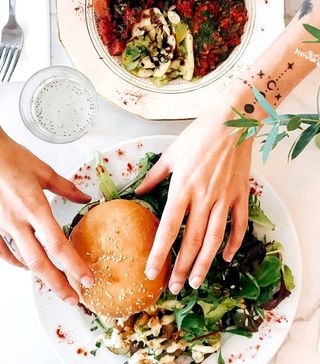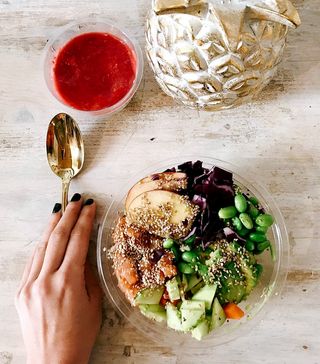How to Silence Unhelpful Noise Around Food and Dieting, According to Experts

Experts estimate that about 8 million people in the U.S. are currently suffering from an eating disorder—and that’s not even to mention the long, arduous process of recovery nor the rampant misunderstanding of these issues in our culture. As a nod to Eating Disorder Awareness Week (February 26–March 4), we’ll be featuring some of our most thought-provoking content on body image, diet talk, and the stigma and shame that millions of women deal with on a daily basis. Above all else, know that you’re not alone—and if you need help and don’t know where to begin, reach out to the National Eating Disorders Association hotline at (800) 931-2237.
Here’s a scary thought: When I initially sat down to write this piece, I found myself at a loss for words. Not because I hadn’t consulted with some amazing experts or didn’t have a lot to say on the subject (trust me—quite the opposite is true), but the overwhelming scope of the topic—and how much of an impact it’s had on almost everyone in my life in some magnitude or another—all of a sudden felt daunting.
Simply put: How could I possibly capture the nervousness, fear, and shame many of us consistently feel around food and then primly package up a succinct, well-worded antidote to help counteract those emotions? It’s hardly a process that can be achieved in an unfeeling, 3000-word write-up. So instead of adopting an all-or-nothing approach and striving to anticipate, solve, or reverse every frenetic thought or experience we’ve ever felt surrounding food and body image, I’ll be taking some baby steps here. And maybe, alongside some other raw, very real stories about dieting, together we can begin an initiation of sorts, exposing important subjects like this for greater conversation. Baby steps.
To start, I thought it would be important to address the elephant sitting in almost every dining room, a precipitating phenomenon that may seem innocent enough at first (like a surface-level scratch), but when itched, rubbed, and obsessed over can gradually deepen and become slowly infected with parasitic-like outside forces: diet talk—the conversations, comments, and dictations that surround food and have an inherent and immediate impact on our thoughts, feelings, and actions. The unwanted hum that convinces us to forgo the bun on our double-double or the waffle cone with our scoop of mint chocolate chunk. To put it bluntly: Diet talk is the chatter that makes us feel ashamed or guilty for the food we do (or don’t!) consume and the diets we do (or don’t!) follow.
“Eating should not be something you dread or have anxiety around,” explains holistic nutritionist Meryl Pritchard, the creator of Kore Kitchen (a celebrity-loved organic meal delivery service based in L.A.). “Feeding ourselves is a necessary form of self-care. It’s something we need to do every single day, just like brushing our teeth. But unfortunately, many believe or have been taught that counting calories is the only way to manage our health and to lose weight.”
Which, as Pritchard points out, can quickly become stressful, time-consuming, and not at all enjoyable. (By the way, this is precisely why so many experts maintain that dieting simply doesn’t work—period.) However, the stress of dieting doesn’t seem to prevent new, ultra-buzzy weight-loss and lifestyle prescriptions from popping up, like a game of Whac-a-Mole, and perpetuating the unhelpful dialogue and behaviors we subconsciously overhear and ingest on a daily basis. Eek.
After all, we’re only human, and as we’ve slowly become disturbingly desensitized to the toxic umbrella of dieting, weight, and warped societal standards, it’s not surprising that we’ve managed to become numb and vulnerable to the comments, actions, and opinions of the people we surround ourselves with—whether it’s a best friend who’s always trying the latest diet or the family member who always mentions how much food we’re putting on our plates come Thanksgiving dinner.

If I wanted to (and trust me—I don’t), I could fill this entire space with the tales, tribulations, and terrifyingly insensitive experiences involving diet talk I’ve encountered this year alone. And my guess is that if I handed you my keyboard, you could too. Frankly, I’d have to grow another pair of hands and feet to account for how many times I’ve overheard two people slamming one of their friends behind their back for gaining weight, an exercise instructor advocating a 100% carb-free lifestyle and simultaneously body-shaming anyone in class who had a Kit Kat on Halloween, or even a friend dramatically refusing dessert during a birthday dinner out. So let me ask you this: Can you relate? How many times in this past week has something a co-worker said during happy hour, a meal an influencer posted to Instagram, or an offhanded comment made by your S.O. caused you to pause? Or worse, influenced or even altered your thoughts, decisions, or actions for the next five minutes, seven days, or 12 months?
Our feelings and minds are powerful, and whether or not we’d like to admit it, sometimes it feels impossible to not become impressionable—especially where our appearance is concerned. On a personal level, I’ve struggled with an eating disorder since my junior year of high school. And while I’m now in a much brighter place of stability (both mentally and physically), I give you permission, here and now, to call bullshit if I ever try to act like something triggering I see on social media, at a party, or even a local coffee shop hasn’t set some of those shadowy, spider-webbed worries and fears in motion again. However, there is light at the end of the tunnel, and though we can’t act like negative commentary and diet chatter will ever evaporate into thin air, there are some effective and strategic ways to recognize when it’s happening, cope with it, or even come to the realization if, ironically, we’re adding fuel to the fire (again, we’re human, and it can happen to the best of us).
So to lend a helping hand when maneuvering a sticky topic that can quickly transition from barely tender to angry and inflamed, I reached out to some experts in the field who have made it their life’s work to confront, heal, and bring awareness to the dynamic relationship we have with food. The goal: an increase in awareness, sensitivity, and understanding, in addition to some helpful strategies for navigating a toxic dinner table or relationship—be it via social media, your job, or your love life. Let’s dig in, shall we?

1. Curate Your Social Media Feed
Ah, the joys of social media. We love it, we hate it, and, frankly, we don’t quite know what we’d do without it. (PS: If you don’t feel this way, please teach me your ways.) Though it could be said that recently there has been a greater incentive for the masses to cultivate a more positive relationship with our feeds (after proven upticks in depression, anxiety, and those inevitable unhealthy comparisons), social media still presents a double-edged sword.
On one hand, it’s natural to want to follow the people we admire, the people we look up to, and to be honest, the people in one way or another, we want to emulate. Tricky. Why? Because it just so happens that some (although not all!) of our favorite presences boasting uncanny makeup applications, amazing outfit inspiration, or jaw-dropping hair tutorials, may also post startling and stingy food diaries, Olympic-level workouts, or exceptionally flattering photos that cause us to second-guess that amazing post–Friday night brunch of waffles and bacon we inhaled last weekend, the days we decided to forgo a workout in favor of sleep, or the size and shape of our legs in the photos from said Friday night. Comparison is a nasty, nasty game, and when it comes to diet, the influence of social media can become a devastating black hole sparking shame, frustration, and disgust—none of which we were feeling pre-scroll.
“It’s really important to curate your feed,” insists Pritchard. “Only follow people who inspire you with messages that you truly align with. Remove people who make you feel bad about yourself, whether through photos or messages. We are what we consume, so it’s important to be mindful. I like following people who expose their flaws and vulnerabilities because it helps you realize that we’re all just human and nobody is perfect. All of these messages and images will have an impact on the way you look at and speak to yourself.”
Therefore, if someone’s account or posts consistently leaves a bad taste in your mouth (despite how dreamy their shoe habit or travel itinerary is), it’s probably best to hit unfollow—especially if their unhelpful messages cause you to follow suit. After all, how many times have you eaten a hard-boiled egg and kale for breakfast after observing so-and-so eating a hard-boiled egg and kale for breakfast? (And yes, that was an indirect reference to the line from Mean Girls.) Fast-forward T-minus eight hours later when you’re undernourished for the day, bingeing on leftover Christmas cookies, feel like—forgive my French—shit, go to bed, and wake up feeling even worse the next day. It’s a nasty cycle, so it’s best to just avoid it from the get-go and unfollow those who tempt you.
“The best strategy for dealing with diet-triggering social media is to just not engage. Many are fearful of ‘missing out’ or struggle to not tune in; however, social media postings can be a distortion of reality and it’s imperative to remember that what is posted is often not an accurate reflection of reality. Seeking out support, whether from supportive peers or professional help, is always strongly recommended when struggling and needing comfort or positive connection,” explains Allison Chase, PhD, executive director of Eating Recovery Center in Austin.
Not only does Chase stand by the philosophy of avoiding the kind of engagement that may result in negative, manifesting thoughts, but her point that what we see on the screen is not usually the 100% reality is also key. For instance, just because a celebrity, friend, or influencer posts a piece of broiled grapefruit for breakfast doesn’t mean she didn’t indulge in French fries and cocktails later on that evening for happy hour. So instead of focusing your energy and obsessing about what your feed is eating, why not tune into what your body is craving? That way, you’ll feel less crazy about food later on. (Seriously, hell hath no fury like the allure of cream cheese frosting cupcakes after a day of frustrating deprivation.)
[Ed. note: @thereallife_rd, @immaeatthat, and @hummusapien are all amazing resources and accounts to follow if you’re looking to supplement your feed with the helpful, informative, and freeing messages surrounding food and diet. Plus, all three have blogs specifically dedicated to topics such as this one.]
2. How Is Exercise Speaking to You?
“Exercise really just means movement,” Pritchard reminds us. It doesn’t have to mean killing yourself at the gym every single day, but rather just getting your blood flowing, stretching your body, pushing your muscles, and exerting yourself. I really like the messaging from Outdoor Voices for this reason. Their message is “doing things”—meaning to do anything—just move. Move your body for your mind.
Unfortunately, however, many gyms, and even the professional instructors and trainers who occupy said gyms, can make matters worse with the way they approach their messaging and discuss weight loss, dieting, and nutrition. For instance, midway through a spin class the morning after Halloween last year, the male instructor began to vehemently condemn the calorie counts of every kind of candy bar and the “poisonous” repercussions such indulgences have on our health. All of a sudden, the energy in the room completely changed, and I could feel the entire class of spinners (myself included) shrink back in horror, shame, and yes, even fear as we recalled the candy we’d treated ourselves to in the spirit of the holiday. Suffice to say, I haven’t been back to his class. But should I have said something to him? Should I have removed myself from the situation? Should I have reevaluated my thought process afterward?
“It is important to remember that it is common for others to be insensitive about the impact of their words in understanding how these unhealthy patterns impact others, and not because it is their intention, but often a lack of awareness or recognition of the negative impact,” Chase explains. “Therefore, do not take it personally, but rather take care of your own needs.” In other words, if leaving halfway through class is what it takes to avoid feeling guilty or you feel you should stand up to the source directly, it’s important to act on that initiative. (More on what you can actually say is below.)

3. Say something
Whether we’re at work or at the bar, it’s nearly impossible to avoid discouraging comments centered around body and food-shaming. Yes, somehow as a society, we’ve managed to give foods standards of morality, unfairly deeming them as good or evil.
For instance, at a previous job, I had one co-worker who had a rather extreme approach to diet and exercise, and she felt it was her duty to inundate us with her current diet and fitness obsessions, (i.e., which foods she was and wasn’t eating and how much weight she wanted to and/or couldn’t lose).
Considering this dialogue was usually distributed during work events and team happy hours (when the rest of us were anchored with a drink in one hand and five ketchup-drenched fries in the other), this type of commentary was unhelpful, to say the least. In fact, as she’d prattle on about how she was cutting out all fried foods, dairy, gluten, or whatever it happened to be that week, I would notice that everyone else at the table seemed to lose their appetite.
Then fast-forward two hours later, and the majority of fries were gone, consumed by none other than the co-worker who had spent the majority of the happy hour condemning them. And usually, I’d head home feeling hungry, ashamed, and confused. Ashamed because I had let my co-worker’s comments get into my head and dictate my actions (i.e., abstaining from eating the food I really, really wanted to treat myself to) and confused because, well, what the hell?!
“If this co-worker is someone who you have a close, personal relationship with, you can attempt to ask them to not discuss these topics and reflect back that it is not helpful or healthy conversation and even enlist their help when in this situation to help steer the conversation in another direction. For those you are less personally connected with, it is appropriate to say politely and kindly that these topics are not healthy or helpful to focus on, and if the conversation doesn’t change, you can always appropriately remove yourself,” Chase confirms.
“Unfortunately, we’re not really given much nutritional knowledge in school, so most grown adults don’t really know how to feed themselves,” says Pritchard. “That’s why a lot of people resort to trends, fad diets, or popular detoxes to lose weight. The best thing you can do will be something that’s sustainable.
“For example, if someone is on a crazy cleanse where they can’t eat food for two weeks, what happens when the cleanse is over and they go back to their old eating habits? It’s better to do a little bit of something positive every day that will result in a lasting change over time. Trying to do something all at once is just going to set yourself up for failure. Keep that in mind the next time your co-worker is preaching about the benefits of the Master Cleanse.”
What’s more is that situations like these don’t just arise with co-workers, as they frequently occur during nights out with friends and time with family members. So though each situation is unique and you’ll always have to think about the most tactful way to handle a particular experience or person, there are some helpful ways to navigate the next time you’re not eating the appetizers but want to or are scrutinizing the size of your thighs just because the person next to you is.
“It’s possible to assert yourself in a polite and kind manner and mention that ‘this discussion and conversation is really not helpful for any of us, so let’s talk about something else,’” Chase says. "The primary focus is to take care of yourself, not necessarily to educate or change anyone else’s thoughts or behaviors.”
And Pritchard agrees: “Everyone will have an opinion on everything—whether it’s nutrition, politics, or religion. It’s always good to hear what another person’s views are, and it’s beneficial to stay open-minded in all situations, but when you are confident in what you believe in, what you know, and who you are, it’s easier to take in this information and let it roll off your back without sticking. Stay true to yourself and your beliefs, but show respect for other people’s opinions as well.”
However, just make sure that you practice what you preach or in others words, don’t preach. “My advice for speaking about your personal nutrition philosophy is to share if you’re in a comfortable setting or if others have expressed interest, but don’t share it in a way that will make other people feel bad about what they’re doing or eating,” explains Pritchard.
4. Redefine the word "diet"—on your terms
The truth is that it can be just as healthy and important to eat a slice of cake as it can be to eat a kale and salmon salad. The trick is trusting your body and listening to what it wants and what’s going to make you feel fulfilled in that moment. “It’s important to tune into your own body and figure out the foods that are giving you energy and the foods that are taking your energy away. That’s why I don’t like hearing people promote a specific way of eating and being dogmatic about food because that means what every other nutritionist is saying is wrong,” Pritchard explains.
“Although I don’t follow a specific diet, per se, I resonate most with the Ayurvedic way of living. In Ayurveda, they teach you that no matter what you’re eating, whether it’s a cupcake or a bowl of kale, go into it with good intentions and enjoy it. Otherwise, if you’re regretting it and feeling guilty, then it will have a negative effect on your body, which will make it harder to digest, and then you won’t feel good! Food should make you feel good. It’s similar to the way Europeans view food. When they have the big buttery croissant in the morning, they enjoy it and savor every last bite. They allow themselves a nice piece of decadent cake or chocolate, but it’s a small piece. I like this way of eating because it’s enjoyable and you don’t feel restricted or bad about yourself. Instead, you are more connected and aware (not to mention happy). Life is meant to be enjoyed.”
This post was originally published at an earlier date and has since been updated by Erin Jahns.
Disclaimer
This article is provided for informational purposes only and is not intended to be used in the place of advice of your physician or other medical professionals. You should always consult with your doctor or healthcare provider first with any health-related questions.
Erin has been writing a mix of beauty and wellness content for Who What Wear for over four years. Prior to that, she spent two and half years writing for Byrdie. She now calls Santa Monica home but grew up in Minnetonka, Minnesota, and studied writing, rhetoric, and communication at University of Wisconsin, La Crosse. She studied abroad in Galway, Ireland, and spent a summer in L.A. interning with the Byrdie and Who What Wear family. After graduating from UW, she spent one year in San Francisco, where she worked as a writer for Pottery Barn Kids and PBteen before moving down to L.A. to begin her career as a beauty editor. She considers her day-to-day beauty aesthetic very low-maintenance and relies on staples like clear brow serum (from Kimiko!), Lawless's Lip Plumping Mask in Cherry Vanilla, and an eyelash curler. For special occasions or days when she's taking more meetings or has an event, she'll wear anything and everything from Charlotte Tilbury (the foundations are game-changing), some shimmer on her lids (Stila and Róen do it best), and a few coats of the best mascara-type product on earth, Surratt's Noir Lash Tint.